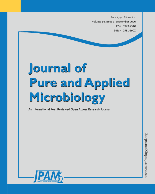
Journal of Pure and Applied Microbiology
Scope & Guideline
Empowering Science with Open Access Microbial Insights
Introduction
Aims and Scopes
- Microbial Diversity and Ecology:
Research on the diversity of microbial communities, including their ecological roles and interactions within various environments, such as soil, water, and human microbiomes. - Pathogenic Microbiology:
Studies on pathogenic microorganisms, their virulence factors, resistance mechanisms, and the clinical implications of infections they cause. - Antimicrobial Resistance:
Investigations into the mechanisms of antimicrobial resistance, patterns of resistance in clinical isolates, and the development of strategies to combat resistant pathogens. - Biotechnological Applications of Microorganisms:
Exploration of microbial applications in biotechnology, including bioremediation, biofertilization, and the production of bioactive compounds. - Food Microbiology:
Research related to food safety, spoilage organisms, probiotics, and the role of microorganisms in food production and preservation. - Environmental Microbiology:
Studies focusing on the role of microbes in environmental processes, including biodegradation, biogeochemical cycles, and the impact of pollutants. - Clinical Microbiology:
Research that addresses the diagnosis, treatment, and epidemiology of infectious diseases, including studies on diagnostic methods and therapeutic interventions.
Trending and Emerging
- Microbiome Research:
A significant increase in studies related to the human microbiome and its implications for health, disease, and therapeutic approaches has been observed, showcasing the importance of microbial communities. - Nanotechnology in Microbiology:
The application of nanotechnology in combating microbial infections and enhancing the efficacy of antimicrobial agents is gaining momentum, leading to innovative therapeutic solutions. - Bioinformatics and Genomic Studies:
There is a growing trend in utilizing bioinformatics tools and genomic approaches to understand microbial genetics, evolution, and interactions, enabling more precise interventions. - Phage Therapy:
Research into bacteriophage therapy as an alternative to antibiotics is emerging as a promising area, particularly in light of rising antimicrobial resistance. - Sustainable Practices in Microbiology:
An increasing focus on environmentally sustainable practices, including bioremediation and the use of microbes in waste treatment and bioenergy production, reflects a broader commitment to ecological health. - Plant-Microbe Interactions:
Research on the interactions between plants and microbes, particularly in enhancing plant growth and disease resistance, is trending as agriculture seeks sustainable solutions.
Declining or Waning
- Traditional Microbial Taxonomy:
Research focusing solely on the classification and identification of microbial species has been declining, likely due to the rise of molecular techniques that provide deeper insights into microbial diversity. - Conventional Antibiotic Testing Methods:
The reliance on traditional methods for antibiotic susceptibility testing has diminished as newer, faster molecular techniques gain traction in clinical and research settings. - Basic Microbial Physiology Studies:
While still important, basic studies on microbial physiology without applied focus are being overshadowed by research with direct implications for health, environment, and industry. - Single-Species Studies:
Research focusing on single species is less common as there is a growing emphasis on understanding microbial interactions within communities and ecosystems.
Similar Journals

AIMS Microbiology
Fostering collaboration and innovation in microbiological research.AIMS Microbiology, published by the American Institute of Mathematical Sciences (AIMS), is an esteemed Open Access journal dedicated to advancing the field of microbiology since its inception in 2015. With an ISSN of 2471-1888, the journal aims to disseminate high-quality research and innovative findings pertaining to both fundamental and applied microbiology, encompassing areas such as medical microbiology, immunology, and related life sciences. Recognized for its academic rigor, AIMS Microbiology has achieved a significant standing, evidenced by its current Q2 ranking in both Microbiology and Medical Microbiology categories, along with impressive percentile rankings within prestigious Scopus metrics. Based in the United States, the journal not only emphasizes accessibility and widespread dissemination of knowledge but also plays a crucial role in fostering collaboration among researchers and professionals in the microbiological sciences. By providing a platform for collaborative research and innovative ideas, AIMS Microbiology is poised to influence the future development and application of microbiological research, making it a valuable resource for students, researchers, and practitioners alike.

Microbiology Research
Elevating Microbiology: Where Research Meets AccessibilityMicrobiology Research, published by MDPI, stands as a pivotal open-access journal in the field of microbiology, having established its presence since 2010. Based in Switzerland, this journal strives to provide a platform for innovative research and cutting-edge findings in various branches of microbiology, including medical microbiology and molecular biology. With an impact factor that reflects its dedication to scholarly excellence, Microbiology Research is classified in the Q3 category for both microbiology and medical microbiology, and Q4 for molecular biology as of 2023, indicating its growing importance and outreach within these domains. The journal aims to foster discussion and collaboration among researchers, professionals, and students by presenting articles that cover a wide array of topics and methodologies in microbiological research. Leveraging its open-access model, Microbiology Research ensures that high-quality research is accessible to a global audience, thus facilitating the advancement of knowledge and innovation in the microbial sciences.

JOURNAL OF BASIC MICROBIOLOGY
Unveiling the Secrets of Microbial LifeJOURNAL OF BASIC MICROBIOLOGY is a premier publication in the field of microbiology, published by WILEY since 1985. With a significant presence in Germany, this journal encompasses a wide spectrum of research topics, focusing on applied microbiology and biotechnology as well as diverse areas within medicine. Holding a commendable Q2 ranking in both its categories for 2023, it plays a crucial role in disseminating innovative findings and methodologies to the community. Researchers will find it to be an essential platform for sharing high-quality work, where it currently stands at rank #47 in the applied microbiology and biotechnology category, representing the 63rd percentile among international journals. The JOURNAL OF BASIC MICROBIOLOGY caters to a growing audience of professionals and students, offering insights essential for advancement in microbiological research and its applications. While it does not currently offer an Open Access option, it remains an influential outlet for academic excellence, continuously contributing to the development of the field through its rigorous peer-reviewed articles.
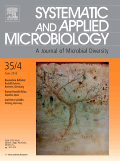
SYSTEMATIC AND APPLIED MICROBIOLOGY
Exploring Innovations in Applied MicrobiologySYSTEMATIC AND APPLIED MICROBIOLOGY, with ISSN 0723-2020 and E-ISSN 1618-0984, is a prestigious journal published by Elsevier GmbH, located in Munich, Germany. Established in 1983, this journal provides a critical platform for the dissemination of high-quality research in the fields of applied microbiology, ecology, and biotechnology. With a commendable impact reflected in its 2023 Q1 ranking in Applied Microbiology and Biotechnology, and Ecology, Evolution, Behavior and Systematics, along with a Q2 ranking in Microbiology, SYSTEMATIC AND APPLIED MICROBIOLOGY maintains a high standard of scholarly excellence. As part of the Scopus database, it ranks prominently—79th out of 721 in Ecology, and within the top quartiles for its relevant fields, potent in disseminating implications for researchers, professionals, and students alike. Although it does not offer open access, the journal is dedicated to advancing knowledge and innovation in microbiological research, making it an essential resource for anyone in the field seeking to stay abreast of current findings and applications.
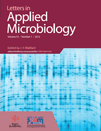
LETTERS IN APPLIED MICROBIOLOGY
Advancing the Frontiers of Microbial ScienceLETTERS IN APPLIED MICROBIOLOGY, published by OXFORD UNIVERSITY PRESS, is a prominent journal in the field of applied microbiology, serving as an essential platform for researchers and professionals to disseminate innovative findings. With an ISSN of 0266-8254 and an E-ISSN of 1472-765X, this peer-reviewed journal has been contributing to the scientific community since 1985 and continues to engage with cutting-edge research through 2024. With its current Scopus ranking placing it in the 45th percentile of its category, specifically at rank #70 out of 127 in the Applied Microbiology and Biotechnology field, it underscores its significance in advancing knowledge and applications pertinent to microbial science. Although it is not open access, LETTERS IN APPLIED MICROBIOLOGY offers comprehensive insights aimed at enhancing the understanding of microbiological phenomena in practical scenarios, making it a valuable resource for both seasoned experts and emerging scholars.

FOLIA MICROBIOLOGICA
Fostering Knowledge for Future Microbiologists.FOLIA MICROBIOLOGICA is a distinguished academic journal published by SPRINGER, focusing on the intricate realms of microbiology and its contributions to medicine. Since its inception in 1957, the journal has been a vital platform for disseminating pioneering research, addressing contemporary challenges in the field while facilitating discourse among researchers, clinicians, and students alike. With an ISSN of 0015-5632 and an E-ISSN of 1874-9356, FOLIA MICROBIOLOGICA publishes original articles, reviews, and critical insights that span not only traditional microbiological studies but also innovative applications in immunology and biotechnology. The journal is categorized within the esteemed Q2 tier in Medicine (Miscellaneous) and holds a Q3 rating in Microbiology as of 2023, reflecting its significant impact and relevance in the scientific community. Although it does not currently offer open access, it remains a respected resource, enabling professionals and students to keep abreast of advancements from its base in the Netherlands. With a strong commitment to quality and rigorous peer-review, FOLIA MICROBIOLOGICA serves as an essential repository of knowledge, fostering the next generation of microbiologists and medical practitioners.

APPLIED MICROBIOLOGY AND BIOTECHNOLOGY
Empowering discoveries that shape our world.Applied Microbiology and Biotechnology, an esteemed journal published by Springer, serves as a vital resource in the domains of microbiology and biotechnology. With an impressive impact factor reflecting its quality, the journal holds Q1 rankings in various categories including Applied Microbiology and Biotechnology, Biotechnology, and Medicine (Miscellaneous) as of 2023. Spanning the years from 1984 to 2024, it underscores its commitment to disseminating groundbreaking research that addresses pressing challenges in health, agriculture, and environmental sustainability. The journal is rigorously indexed and holds respectable positions in Scopus rankings, notably within the top 15% of Applied Microbiology and Biotechnology and the top 15% in Biochemistry, Genetics, and Molecular Biology. Although it is not Open Access, its comprehensive articles, reviews, and short communications are indispensable for researchers, professionals, and students eager to advance their understanding and application of microbial processes and biotechnological innovations in real-world contexts.
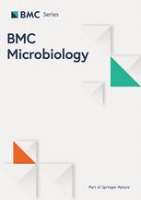
BMC MICROBIOLOGY
Innovating the future of microbiology, one study at a time.BMC Microbiology is a leading open access journal published by BMC, dedicated to advancing the field of microbiology since its inception in 2001. With an ISSN of 1471-2180, this journal provides a vital platform for researchers, professionals, and students to share and access high-quality research and innovation in both general and medical microbiology. Based in the United Kingdom, BMC Microbiology holds a commendable Q2 ranking in both various microbiological categories according to the 2023 Scopus rankings, indicating its strong influence in the microbiological community, with a rank of #47 out of 140 in Medical Microbiology and #62 out of 182 in general Microbiology. The journal's commitment to open access ensures that groundbreaking research is freely available to facilitate collaboration and knowledge sharing among the global community of microbiologists. With a focus on publishing original research, reviews, and case studies, BMC Microbiology plays a critical role in disseminating information that can impact health and environmental conditions around the world.
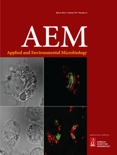
APPLIED AND ENVIRONMENTAL MICROBIOLOGY
Pioneering Research for Environmental and Industrial SolutionsApplied and Environmental Microbiology, published by the American Society for Microbiology, stands as a leading journal in the fields of applied microbiology and environmental science since its inception in 1976. With a prestigious Q1 quartile ranking across multiple categories including Applied Microbiology and Biotechnology, Ecology, and Food Science, this journal consistently disseminates high-impact research that drives innovation and advances our understanding of microbial interactions within our ecosystems and industries. As ranked by Scopus, it exhibits prominent rankings in various related fields, underscoring its critical role in shaping contemporary microbiological research. Researchers, professionals, and students alike can stay abreast of groundbreaking studies while contributing to a vast body of knowledge that spans diverse aspects of microbiology, biotechnology, and ecology, ultimately contributing to sustainable practices. Join the community of dedicated scholars and explore vital research findings that impact both environmental health and technological advancement.

JOURNAL OF MICROBIOLOGY AND BIOTECHNOLOGY
Innovating Knowledge for a Sustainable FutureJOURNAL OF MICROBIOLOGY AND BIOTECHNOLOGY, published by the Korean Society for Microbiology and Biotechnology, is a premier academic journal based in South Korea that has been at the forefront of advancing knowledge in the fields of microbiology, biotechnology, and their applied sciences since its inception in 1991. This journal holds a commendable Q2 quartile ranking in key categories, including Applied Microbiology and Biotechnology, showcasing its significant impact within the academic community. With an emphasis on high-quality, peer-reviewed research, the journal aims to disseminate innovative findings that foster deeper understanding and advancements in microbial and biotechnological sciences. Researchers, professionals, and students utilize this journal to stay informed about contemporary developments and to inspire future investigations. Although it is not an open-access journal, its content is accessible through various academic libraries and databases, providing a vital resource for those engaged in cutting-edge research.